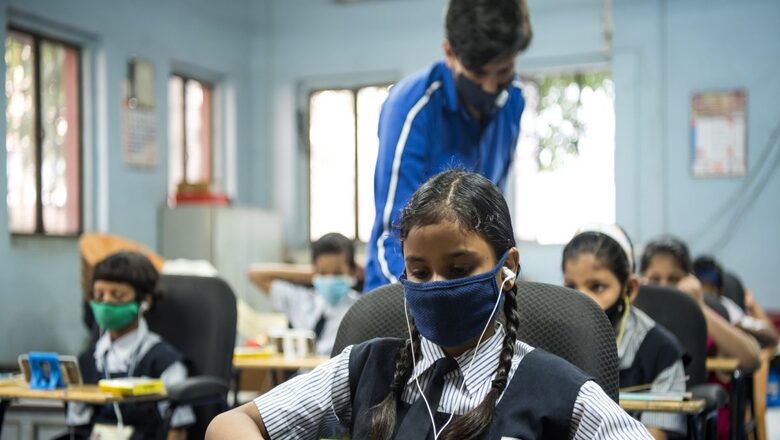
views
Education Technology, popularly known as EdTech, has revolutionised the education sector in recent years. It has transformed the pedagogical skills of teachers and widened the scope of learning of the students in classrooms today. Shutting down of schools during the pandemic stamped on EdTech’s relevance and accelerated its adoption, and there is no denying that it is here to stay.
EdTech has two facets, one — involving advanced software applications and hardware technology for teaching in the classrooms, and the second — growing online courses through smartly engaging curriculums. Growth in the Indian EdTech sector has been backed by growing demand as well as innovative learning models offered by homegrown EdTech startups, aided by a facilitative new education policy. The National Education Policy (NEP) 2020 has provided fresh policy impetus to the EdTech sector by recognising the role of technology in education. The sudden onset of Covid left no other option for the traditional educational setup but to quickly adapt and continue the provision of quality education to students across the board. According to a joint report by Nielsen and the Broadcast Audience Research Council India, there was a 30 percent increase in the usage of education applications on smartphones since the lockdown. Today, while we hope to have left the pandemic behind us, there is still strong merit in integrating traditional classroom teaching with EdTech.
EdTech involves the use of digital platforms, software tools, and devices to facilitate education and enhance the learning experience of students. The introduction of technology in classrooms has made learning more interactive, accessible, and engaging. It allows students to learn in ways and at a pace that is more suited to them as individuals, which in turn leads to better learning outcomes. In fact, AI-enabled technologies render personalised learning experiences for students by analysing their learning abilities and customising the curricula to match their specific needs.
Technology has also made it possible for every student to read and learn in their vernacular language, which has been proven to lead to improved learning outcomes, especially in the early years of education. Innovative digital tools such as e-books, digital videos, 3D visuals, simulations, and games also reduce rote learning and encourage the application of the mind. This not only enhances the teaching experience but also motivates students to participate actively in the learning process. For instance, digital models and simulations make complex concepts easier to understand for students, especially in subjects such as Physics, Chemistry, Mathematics, and other technical subjects.
EdTech has also made education accessible to those who previously lacked access. This is crucial in a country like India, where many students cannot attend school due to issues such as distance, financial difficulties, or a lack of infrastructure, particularly in rural areas. The government has been striving to improve access to educational materials and classes online through various e-learning initiatives such as SWAYAM, e-Pathshala, PM e-Vidya, DIKSHA etc. With the availability of such online learning platforms, students can engage in flexible learning at their own time and convenience, thereby reducing commute time, and allowing them to focus better. Online courses, open educational resources (OERs), and Massive Open Online Courses (MOOCs) are also examples of such learning options.
Another way EdTech is transforming education in India is by aiding teachers in delivering quality content. Teachers can leverage digital platforms to curate their worksheets, quizzes, and lesson plans easily or have access to pre-existing engaging and interactive content. Additionally, many EdTech platforms have integrated communication features that enable seamless communication between teachers, students, and parents. These platforms also have tools for live classes, assessment, and feedback, which makes it easier for teachers to evaluate students understanding and progress. The availability of such tools aids in shared accountability between stakeholders, leading to better educational outcomes. Further, emerging technologies such as blockchain also offer transformative solutions for teachers. The benefit of blockchain is that it can enable safe storage and sharing of transcripts and other academic records. The application of such technologies reduces the burden on teachers, allowing them to focus on addressing the individual needs of students and helping them in their learning process.
Apart from the formal education space (K-12), the EdTech industry in India is also providing new learning opportunities in upskilling and professional training. The convenience of online learning has made it easier for working professionals to upskill and expand their skillset without affecting their work schedule. As per a LinkedIn survey, in 2020, almost 63 percent of professionals had taken up online learning to enhance their skills or reskill themselves to stay relevant.
Despite the many advantages of EdTech, there remain concerns about the social and economic disparities. Not all students in India have access to digital devices, reliable internet connections, or electricity. These technological divides are prevalent, particularly in rural areas, where access to electricity, let alone digital devices, is a challenge. This is where the private sector can play a crucial role, in partnership with state governments, to improve access to learning and address learning gaps. The market of EdTech startups is expanding phenomenally and some, through their altruistic initiatives, are committed to providing free access to their learning materials to underprivileged students from rural backgrounds under their Education for All (EFA) initiative.
According to the India Brand Equity Foundation (IBEF), the Indian EdTech sector is expected to reach USD 30 billion by 2031, from USD 700-800 million in 2021. It is already transforming the teaching and learning landscape in India, heralding an era of personalised learning, flexibility, and engagement. It has the potential to transform India’s education sector, creating a more inclusive and accessible learning environment. We must leverage it to the fullest and catapult ourselves on the path of attaining SDG 4 by 2030 i.e., ensuring inclusive and equitable quality education and promoting lifelong learning opportunities for all.
Dr Veerendra Mishra is IPS officer from MP Cadre, H. Humphrey Fulbright Fellow and Kalinga Fellow. Views expressed in the above piece are personal and solely that of the author. They do not necessarily reflect News18’s views.



















Comments
0 comment